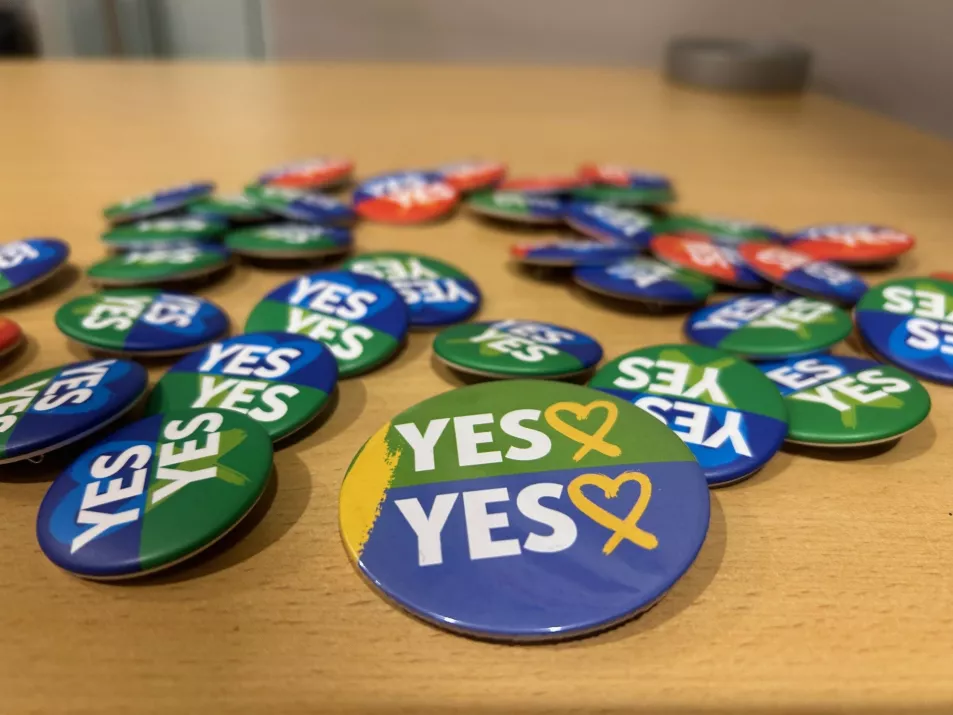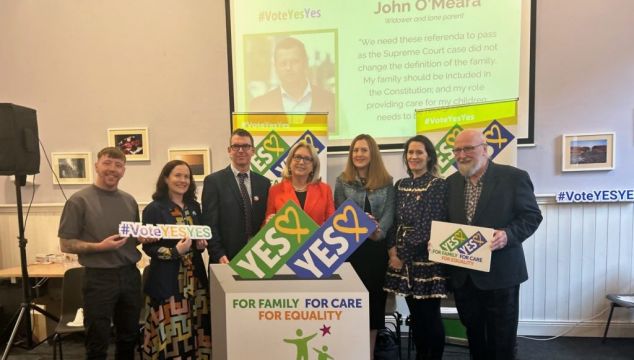Former president Mary McAleese has called for a “yes” vote in the referendums on family and care.
Ms McAleese said the amendments would take Ireland “another step towards the egalitarian future that our citizens desire”.
Two referendums will be held on March 8th proposing to change the Constitution.
The family amendment proposes extending the meaning of family beyond one defined by marriage and to include those based on “durable” relationships.
The care amendment proposes deleting references to a woman’s roles and duties in the home, and replacing it with a new article that acknowledges family carers.

Ms McAleese said that people had a “responsibility” to vote in the referendums.
“March 8th is our opportunity to insert new realities, new energy, new insights into parts of our constitution that have just aged badly.”
She told a media event on Friday: “I intend to vote ‘yes’ to both proposed changes to the Constitution because I am persuaded strongly that they will reflect the overwhelming impulse for equality and inclusivity that is the hallmark of modern Ireland.
“They remove from the constitution language and attitudes that have long been controversial on account of perceived sexism.
“They will also stop the marginalisation of many good, decent people whose strong contribution to family and community life has been completely under-valued, rendered second class.”
Ms McAleese was speaking at an event titled We Are Family jointly hosted by Treoir and One Family as part of a wider platform of civil society organisations calling for “yes” votes.
The former president said it was “unacceptable” that families outside marriage and civil partnerships were not being recognised by the Constitution.
On the second referendum which deals with what is commonly referred to as the “women in the home” article, Ms McAleese said there are conflicting views on the current provision.
She said some people see it as patronising and paternalistic while others see it as valuable recognition of women’s work in the home.
However, Ms McAleese said it was “anachronistic”.
She said: “It is no longer suited to an Ireland anxious to promote gender equality.”
Ms McAleese said the reality is that care can be “stretched across a vast spectrum of everyday reality life”.
“In recent years that invisible world of what constitutes care within so many families has been revealed.”
She said a “yes” vote for the proposed amendment would put a “renewed spotlight” on family care.
She said those who drafted the Constitution always expected it to be changed.

“There is simply no value in holding on to those outdated concepts for the sake of nostalgia.”
Ms McAleese added: “To leave those articles as they are would contradict the dynamic of the momentum of our people.”
Other speakers included John O’Meara, who recently won a case at the Supreme Court which found he was entitled to the widower’s pension even though he was not married or in a civil partnership with his long-term partner.
Mr O’Meara and his three children challenged a High Court decision to uphold the refusal by the Department of Social Protection to grant him the pension.
The seven-judge Supreme Court unanimously said that the section of legislation which had excluded the O’Mearas was “invalid”, having regard to a different Article of the Constitution of Ireland, which states that all citizens should be equal before the law.
Speaking at the event on Friday as the carer of his children, he said that the case did not change his constitutional position: “I’m still not recognised as in a family even though I won that case.”
The first of the proposed amendments would extend constitutional protection to families founded on “other durable relationships”.
Mr O’Meara said he was supporting a “yes” vote in both referendums.
Sinaad Gibney, a single parent and former chief commissioner of the Irish Human Rights and Equality Commission, said her relationship with her daughter was a “unique bond”.
Ms Gibney said: “The reality is families come in all shapes and sizes.”
She added: “It is painful for me that my beautiful little family, of me and my daughter, is not recognised in the Constitution as a ‘real’ family.”
The event was chaired by columnist and former Barnado’s chief executive Fergus Finlay who said he disagreed with those calling for a “no” vote in the second referendum.
However, he said there was an “unfought battle” over disability rights in Ireland.
Deirdre McCarthy, a social worker from Co Cork, also told the audience she was supporting a “yes” vote in both referendums.
Ms McCarthy, who became a lone parent at 17, said she felt “abandoned” by the Constitution as her living situation was not recognised as a family.
She said that in 2023 some 41 per cent of children were born outside marriage and civil partnerships.
Christopher Tuite, a support worker, said he became a father at a very young age.
He said he is an equal partner with his child’s mother but he is recognised constitutionally as a single male because they are not married.
He said he would be voting “yes” in both referendums, adding: “Fathers cannot continue to be left on the sidelines.”
Maxine Walshe, a psychotherapist and carer, said she works with lone parents who struggle to make ends meet and feel isolated.
She added: “The fight won’t be over on March 8th, but a ‘yes, yes’ vote puts us in a much stronger position to push for that change.”

Fergal Landy, chief executive of the National Forum for Family Resource Centres, said the group was “strongly encouraging” people to vote in favour of the proposed amendments.
He said: “It aligns with our views of equality, human rights and inclusion. We don’t think any family should feel excluded in society.”
Mr Landy said he believed he was in a “durable” relationship with his long-term partner with whom he has three children.







